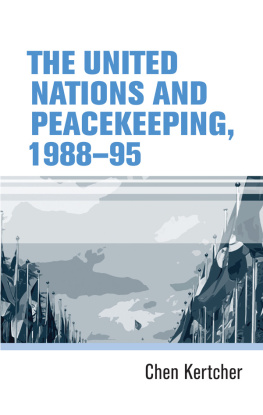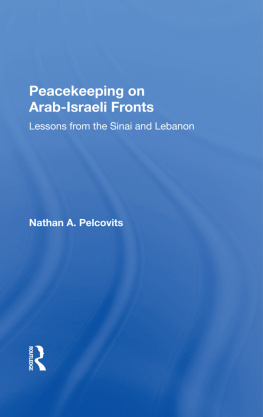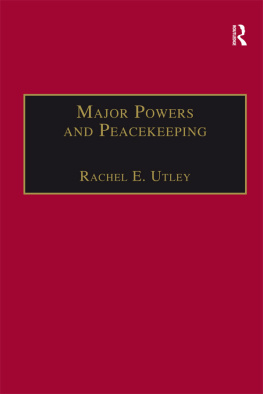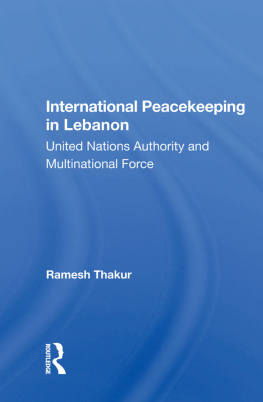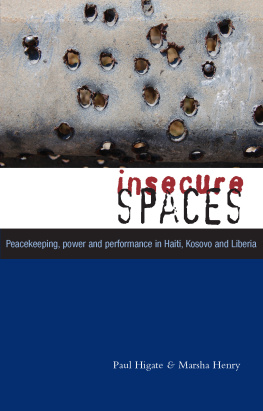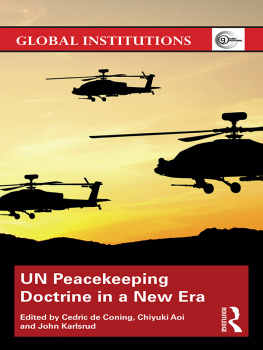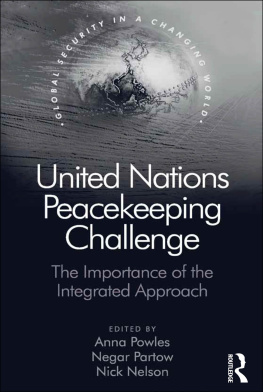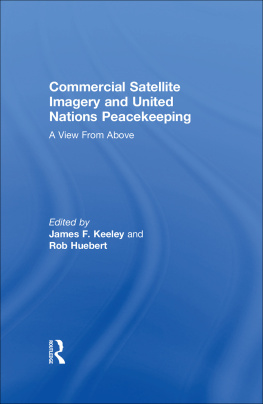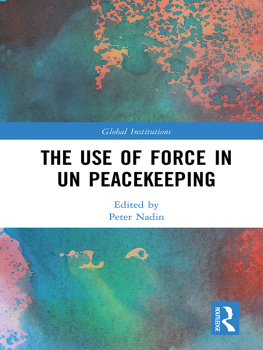The United Nations and peacekeeping, 198895
The United Nations and peacekeeping, 198895
Chen Kertcher
Manchester University Press
Copyright Chen Kertcher 2016
The right of Chen Kertcher to be identified as the author of this work has been asserted by him in accordance with the Copyright, Designs and Patents Act 1988.
Published by Manchester University Press
Altrincham Street, Manchester M1 7JA
www.manchesteruniversitypress.co.uk
British Library Cataloguing-in-Publication Data
A catalogue record for this book is available from the British Library
Library of Congress Cataloging-in-Publication Data applied for
ISBN 978 1 7849 9273 6 hardback
First published 2016
The publisher has no responsibility for the persistence or accuracy of URLs for any external or third-party internet websites referred to in this book, and does not guarantee that any content on such websites is, or will remain, accurate or appropriate.
Typeset by Out of House Publishing
Contents
This work represents several years of sculpting a manuscript out of a huge marble made of thousands of UN pages.
Above all, I owe special gratitude to Prof. Aron Shai, who challenged me to deal with such a large and ambitious project on a global scale.
The tedious and exhausting work mentally, intellectually and sometimes physically would not have been possible without the support, advice and guidance of the following people: Dr. Efrat Elron, Prof. Elie Barnavi, Prof. James Gow, Prof. Arie Kacowitz, Prof. Billie Melman, M. Des. Willy Mizrahi, Dr. Shimon Naveh, Prof. Benni Neuberger, Prof. Iris Rahamimov, Prof. Raanan Rein, Prof. Galia Golan and Prof. Moti Tamarkin. There are many more, but unfortunately space prevents me from naming all of them.
Special thanks are reserved for the archivists at the UN archives in New York and the UN deposit library at the National Library in Jerusalem.
This work was sponsored by the generous funding of the Israeli Council for Higher Education Rotenstreich Fellowship, a research scholarship from the Tami Steinmetz Peace Center at Tel Aviv University and my time as a junior fellow at the S. Daniel Abraham Center for International and Regional Studies at Tel Aviv University.
My parents, Yosi and Ruti, and my brother, Zack, were a fountain of faith in my work.
Last but not least, I owe apologies and gratitude to my dear wife, Hagar, and our three daughters, who had to bear my endless remarks on the UN and peacekeeping, and still encouraged me to continue. This book is dedicated to them.
Organisations and agencies
| ASEAN | Association South East Asian Nations |
| CIS | Commonwealth of Independent States |
| DPKO | Department of Peacekeeping Operations |
| EC | European Community |
| ECOSOC | Economic and Social Council |
| ECOWAS | Economic Community of West African States |
| EU | European Union |
| ICRC | International Committee of Red Cross |
| MPLA | Movimento Popular de Libertao de Angola |
| MSC | Military Staff Committee |
| NAM | Non-Aligned Movement |
| NATO | North Atlantic Treaty Organization |
| NGO | non-governmental organisation |
| OAU | Organization of African Unity |
| OIC | Organization of Islamic Conference |
| OSCE | Organization for Security and Cooperation in Europe |
| OSPA | Office for Special Political Affairs |
| P5 | Permanent five members of the UN (the United States, the Soviet Union, the United Kingdom, China and France) |
| SCPKO | Special Committee for Peacekeeping Operations |
| SRSG | Special Representative of the Secretary-General |
| SWAPO | South West Africa People's Organization |
| TC | Trusteeship Council |
| UNAVEM | United Nations Angola Verification Mission |
| UNEF | United Nations Emergency Force |
| UNFICYP | United Nations Peacekeeping Force in Cyprus |
| UNHCR | United Nations High Commissioner for Refugees |
| UNIFIL | United Nations Interim Force in Lebanon |
| UNITA | Unio Nacional para a Independncia Total de Angola |
| UNTAG | United Nations Transition Assistance Group |
| USG | Under-Secretary-General |
Cambodia
| CPP/SOC | Cambodian Peoples Party/Phnom Penh government |
| DK | Democratic Kampuchea |
| FUNCINPEC | Front Uni National pour un Cambodge Indpendant, Neutre, Pacifique, et Coopratif |
| ICORC | International Committee on the Reconstruction of Cambodia |
| KPCP | Kampuchean Peoples Revolutionary Party |
| KPNLF | Khmer People's National Liberation Front |
| PDK | Party of Democratic Kampuchea / Khmer Rouge |
| SNC | Supreme National Council |
| UNAMIC | United Nations Advanced Mission in Cambodia |
| UNTAC | United Nations Transitional Authority in Cambodia |
Former Yugoslavia
| FRY | Federal Republic of Yugoslavia (Serbia and Montenegro) |
| ICFY | International Conference on the Former Yugoslavia |
| ICTY | International Criminal Tribunal for the Former Yugoslavia |
| KFOR | Kosovo Force |
| NIOD | Netherlands Institute for War Documentation |
| SFRY | The Socialist Federal Republic of Yugoslavia |
| UNMIK | United Nations Interim Administration Mission in Kosovo |
| UNPA | United Nations Protected Areas |
| UNPROFOR | United Nations Protection Force |
| YNA | Yugoslavia Peoples Army (Jugoslavenka Narodna Armija) |
Somalia
| SNA | Somali National Alliance |
| TNC | Transitional National Council |
| UNITAF | Unified Task Force |
| UNOSOM | United Nations Operation in Somalia |
| USC | United Somali Congress |
Between the late 1980s and the early 1990s, there was a major shift in the position of the United Nations in the world. After the organisation had been shunted aside for most of the Cold War years, it returned to enjoy international centre stage; the large, multifunctional peacekeeping operations were catalysts in this process. The organisations member states mobilised themselves to promote those initiatives that encouraged both political arrangements and other political, economic and security measures such as humanitarian aid, resettlement of refugees, demobilisation of armed forces, economic development and advancement of good government in order to resolve active conflicts using these tools. Simultaneously, intensive discussion was held between the member states and United Nations institutions regarding the potential of these operations.
This global history study examines the concept and practice of United Nations peacekeeping operations from 1988 to 1995. The research is anchored primarily in United Nations documents produced following the diplomatic discussions that took place in the organisation on the subject of peacekeeping in general and in the cases of Cambodia, the former Yugoslavia and Somalia in particular. Studies on peacekeeping operations tend to overlook the importance of the diplomatic discussions that occurred, and are still occurring, at the United Nations. In this study I chose to examine these discussions in order to uncover the routine realignment of members in political groups that worked on different issues of peacekeeping and thus to offer different explanations from the ones that are usually given on the motivation for executing peacekeeping operations, the way they were executed, and their outcomes in different regions and on the work of the United Nations.

